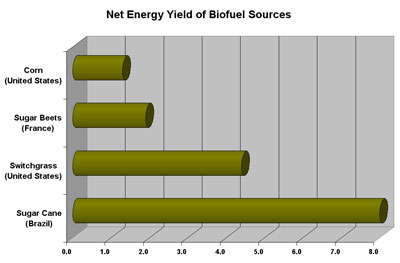Brazil will restrict sugarcane plantations for ethanol production from the Amazon, the Pantanal, and other ecologically-sensitive areas under a plan announced Thursday by President Luiz Inacio Lula da Silva’s administration, reports the Associated Press.
Environment Minister Carlos Minc said the proposal, which will be voted on by Congress next year, would limit sugar growing to an area of 66 million hectares (163 million acres), or 7.5 percent of Brazil. Presently Brazil has about 9 million ha (22 million acres) of cane plantations, which make it both the world’s large producer of sugar and cane ethanol, but the country expects to expand this by 6 million ha (15 million acres) over the next decade to meet rising demand for biofuels.
Sugarcane-based ethanol is used widely in Brazil, accounting for more than 20 percent of Brazil’s transport fuel market. Nearly all new cars sold in the country are capable of running on conventional oil, ethanol-gasoline mix (“gasohol”) or bioethanol. The move has helped Brazil move towards energy independence — it has effectively replaced more than a quarter of its gasoline demand with sugar-cane based fuel grown on 5 percent of its crop area.
 Net energy yield for various crops |
But there have been environmental and social costs associated with the rise of ethanol production in Brazil. The Atlantic forest, a biologically-rich ecosystem found along the eastern seaboard, has been one casualty of cane expansion, while the plantation industry has been linked to labor abuses, including “conditions analogous to slavery” in some areas, according to the Brazilian government. Some researchers have also argued that sugarcane expansion has displaced ranchers and small farmers to ecologically sensitive regions, including the Amazon, resulting in deforestation and forest degradation.